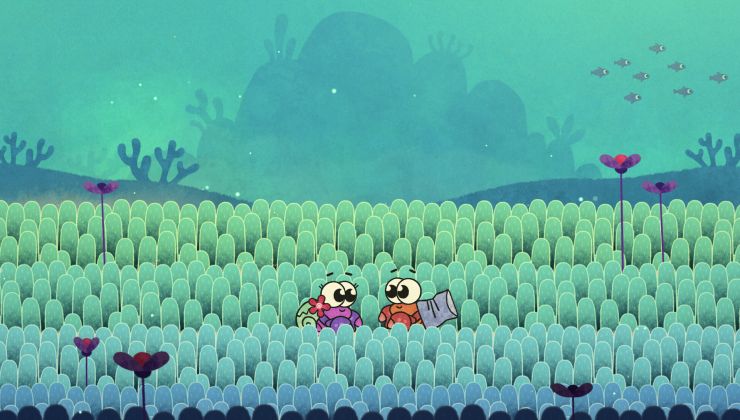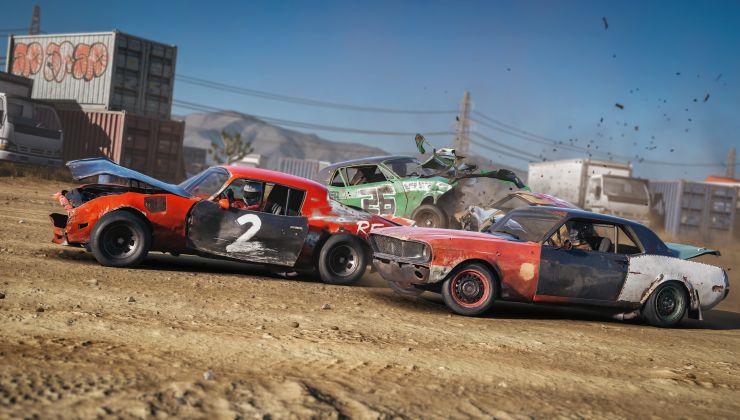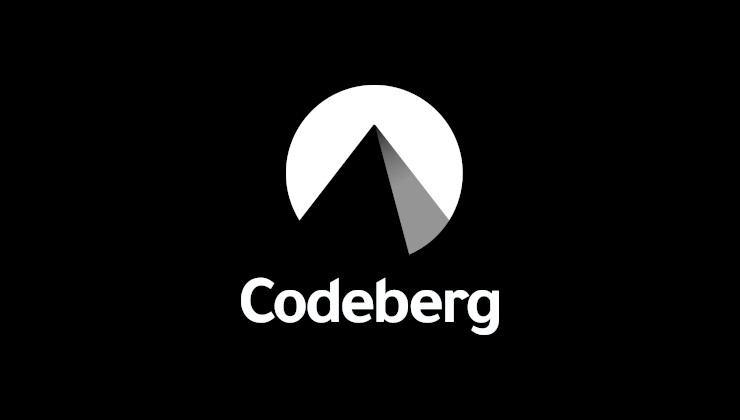Valve have put out a news post to highlight some of the top games put onto Steam in May and it's another reminder of why Steam Play is needed.
In this blog post they start by listing 20 games that had the top revenue earned in the first two weeks following their release. Without looking, take a guess at the number of games in that list that actually support Linux.
Did you take a guess? The answer is a rather sobering two: Rise of Industry and Total War: THREE KINGDOMS. What happens to that number if we include those that can be run with Steam Play, with a "Platinum" rating from user reports on ProtonDB? That brings it right up to nine, which is far more impressive. It would be even higher, if Easy Anti-Cheat and BattlEye worked with Steam Play and since both said they're working on it (Sources: EAC - BattlEye), things can only get better.
They also went over the top five free games, measured by peak player count within the first two weeks following release: Conqueror's Blade, Splitgate: Arena Warfare, Minion Masters, Eden Rising and Never Split the Party. Of those, only one supports Linux which is Never Split the Party. If we take "Platinum" Steam Play games again, that only rises to two.
Note: The top free games list has two entries that also appear in the top revenue list.
Without popular games, Linux gaming won't grow to a point where it will be noticeable. Once again, this is a big reason why Steam Play is going to help in the long run. First we get games, then we get players, then we hopefully get developers wanting control with their own supported Linux builds.
What's interesting though, is this only takes into account the first two weeks in both cases. Taking a look myself a bit closer, out of the top 20 games most played on Steam right now (players online) only one of those games Valve listed in the blog post actually make it at all, which is Total War: THREE KINGDOMS and that does support Linux. Going even further, out of the top 100 games on Steam for player count, from Valve's list, only currently Total War: THREE KINGDOMS shows up.
As a quick additional and interesting measure for June: Looking at the top 20 by player count right now, how many in total support Linux? A much healthier 10, so half which isn't so bad. Stretching it out even more, from the top 100 by player count, 43 of them support Linux.
So while we don't get the "latest and greatest" games, keep in mind that we do have a lot of games that stay popular supported on Linux, so there's at least a silver lining of sorts there.
I've said it before and I will say it again, "no tux no bucks" does more harm than good and this shows why
No Tux No Bux is exactly what we need more of so that we get more Linux support. We want to be Linux gamers and help the Linux support ecosystem, not Windows gamers helping the Windows support ecosystem.
The cold hard truth is that devs will not support linux until the market grows. You think they support Windows because they like Windows? Nope, they support it because that is where the users are. Devs won't develop for linux because there are not enough users, users will not move to linux because that is not where the games they want to play are. Emulation and compatibility layers were always the best hope for linux gaming
No, the cold hard truth is supply and demand, which means Linux support depends on gamers demanding it, and if Proton hurts gamers demanding it rather than encouraging more of that demand due to more gamers switching to Linux and then demanding it, then Proton is hurting more than helping.
If the demand for Linux support overall decreases, then there will be fewer and fewer games with Linux support, and Microsoft wins. We don't want Microsoft's APIs being used more, we want them being used less, and we want developers providing us with more support not less.
Thats not how economics works. Why would any business create a product for a market that does not exist or is irrelevant in terms of the size of that market? Businesses always look at the size of the market and how much they could possibly get in sales vs the cost of servicing that market. The truth is for many game devs, the outgoings vs projected revenue isn't worth it. We have to show them that the market exists. The only metrics that really matter are sales metrics
Yes the sales are important, and we have for years now seen a lot of games been published that have Linux support, off course a lot a crap, or in a genre that a given gamer does not like, but there also have been a lot of really good games.
The question is will we keep getting good games we like, and we should not count on that a compatibility layer of a moving target which Windows is will be compatible for new releases.
There is the Epic store, and the fear that some think drove Valve to support Linux, that Microsoft will succeed to change Windows into a walled garden with the Windows store or something else.
Thats not how economics works. Why would any business create a product for a market that does not exist or is irrelevant in terms of the size of that market? Businesses always look at the size of the market and how much they could possibly get in sales vs the cost of servicing that market. The truth is for many game devs, the outgoings vs projected revenue isn't worth it. We have to show them that the market exists. The only metrics that really matter are sales metrics
Imagine you and a small group of people want chairs. All that's produced is tables. Then half of the group starts going to the retailer, buying tables, but tell everybody "I will use it as a chair! A chair, understand!"
What would be my reaction as a table manufacturer?
I'dsaythink: "Fine, have fun."
It's no incentive at all for me to produce chairs when I know people will still buy my stuff if I wont - quite the opposite.
What they are showing is not a market for chairs - it's a market for "whatever four-legged you make".
I understand that you're saying that less than a percent is not incentive enough to getchairsmany Linux games - it seems you're right. You're hoping for an increasing Linux percentage - I don't see it. But either way, if your long term goal is native Linux games, people must demand native Linux games sooner or later.
Still that first group have something to sit on while the other have to stand.
Look, I'm with you and I think that everyone here is as well and you are damn correct in that we sooner or later must demand native Linux games but as you conclude yourself, 1% is not the enough to make that demand mean anything. There simply is no way around the fact that we have to increase that number (where exactly the limit is I do not know but it clearly is above 1%) and until then all proton does is allow us to still use Linux while getting access to the latest games.
It's been almost a year since Proton came out (August 2018).A few things to note, Proton has been "out" for nearly a year, but it's still very much hidden on Steam. Unless you're going looking for it, you don't really know it exists. It still has a lot of work ahead of it right now, it's early days. If anyone seriously expected a shift in behaviour in less than a year, they're not being realistic in any way.
Where is this fabled growth in market share? Did we even reach 1% of Steam users?
The only thing Proton is doing is strengthening the position of Direct X as the only viable APIs in PC games development, no need for SDL, Vulkan and so on... there is Proton after all!
As for your other bits, well, Vulkan is needed for a big part of Proton remember, so that makes no sense. SDL is also used a lot outside of Linux FYI.
Most Windows users including gamers probably never heard of it, and a lot of Linux users probably neither. Most Linux users do not game, but there probably also still are a lot of dual booters that think you can not have a good gaming experience on Linux base on what they hear and read and maybe tried years ago.
But Proton has a very high visibility in the Linux gamer community, so there is a problem if Proton changes Linux gamers behaviour to buy a lot less Linux games. I do not know if that actually is the case, so I would like to know how Linux developers and publishers have experienced this the last year.
Last edited by Redface on 28 Jun 2019 at 6:14 pm UTC
Exactly, working on that now. Learning LibreOffice Calc graph making in order to graph out Linux games using data from Steam.
I am looking forward to that.
But if you buy a Windows game, youll get a Windows game and devs will make more windows games.
Funny how people pretend Proton/Steamplay could be a game changer to make people to switch, first Linux should have a real "desktop" distro as Pierre Lois Griffais said in his twitter. It was pretty stupid that a change on the linux kernel which was only intended to affect the server side of Linux actually broke the Steam app on most linux distros.
Second Linux should be easier to use as desktop, its a pain in the ass to make a shortcut on any Ubuntu distro, a thing that on Windows takes 1 second.
Fix how Linux works as a desktop first then maybe youll be see people switching, before that, Steamplay is not even worthy.
The same goes for the vast, vast majority of the games I play (strategy, management, simulation, a few puzzles and the rare adventure/visual novel/rpg). With a few exceptions, gaming on Linux is already a solved problem for me. Steamplay already works well enough to fill the most conspicuous holes, performance is rarely a big concern, there is no anti-cheat, and the biggest games have native support.
I mean, of course there is space for improvement. But comparatively, Linux gaming varies a lot depending on genre and category. The real issue is with AAA action games and with multiplayer.
I disagree strongly. It may be that No Tux No Bux is effective for indie games, but for major games it means nothing.I've said it before and I will say it again, "no tux no bucks" does more harm than good and this shows why
No Tux No Bux is exactly what we need more of so that we get more Linux support. We want to be Linux gamers and help the Linux support ecosystem, not Windows gamers helping the Windows support ecosystem.
Imagine the scenario that 10 big companies, Ubisoft and EA to name two, release 10 major games on Linux. As it is we are already at 1%, so few buyers. Then those 10 companies's games have to compete against eachother to get your money. There are other factors too such as maybe the game being released doesn't interest the linux user.
Anyone with common sense will know that "No Tux No Bux" is not effective when it comes to semi major to major games. If I remember correctly Feral even expressed that they are able to do what they do because they are one of few companies catering to Linux. The more big companies support Linux with their games the less profit, and as it is Linux is already not profitable enough with few actors in the playground!
There may come a time when "No Tux No Bux" will have more meaning behind it, and that is when Linux reaches marketshare that makes native ports worth funding. Until that time "No Tux No Bux" is as far as I understand it meaningless.
Last edited by Linuxwarper on 28 Jun 2019 at 6:37 pm UTC
The key that will win us the battle is achieving that oomph! (i.e. bring more gamers on the Linux platform) in order to help us push our agenda further, and Proton is the only real way to do that for the time being, not only from a technical point of view but because it is being actively supported and marketed by the foremost company in the PC gaming industry, that is Valve. Whether we like it or not, once again, it's corporate support that will help us take off the way we want/need to, not our oh so noble ideology of free and open source software. You want another example? Check out just how much more helpful is e.g. Red Hat for furthering the Linux cause compared to the FSF. The latter is certainly a welcome and necessary addition to our "arsenal" (if only for helping us to not lose our way and forget what it is we're fighting for in the first place), but it's Red Hat (and other companies of course) that are really furthering Linux when it comes to increasing its oomph! in the desktop market.
Also, re: demand and "getting what we deserve as a platform" - would you also support the BSDs should they start raising a ruckus demanding equal treatment from the gaming industry..? The key word is, of course, "demanding".
What i don't know is if it is a good idea to buy games that don't support Linux but run with Proton - i'll happily play them if they are in a bundle, but until now i'm refraining from buying them...
Thouse people seem to forget what GNU/Linux actually is.
Anyway, I'm more concerned with Steam being the only store selling Feral games. It puts me in the possition to rely on third-party services for playing the games.
Or there are fewer games for Linux released now that SteamPlay is around. Who can say with certainty? Historical data and statistics probably can. Who is going to dig in?
Hard to say, but I've seen examples of developers using such excuse (inXile/Krome used it, not to release classic Bard's Tale trilogy for Linux).
I doubt though, it plays a significant role in the global sense. Those who want to release for Linux will, Steamplay or not. Those who don't, always will find another excuse.
Last edited by Shmerl on 28 Jun 2019 at 7:32 pm UTC
Developers should help Valve to get their titles working on it, since a lot of them don't want to pot their games... Capcom...
So if you want to demonstrate demand - reach out to developers directly, create polls, wish requests, vote / comment in existing ones, and etc. Show developers that enough people want to see their games on Linux. That could work.
Examples:
* http://forums.larian.com/ubbthreads.php?ubb=showflat&Number=652719
* https://forum.paradoxplaza.com/forum/index.php?threads/bloodlines-2-for-linux.1162040
* https://www.gog.com/wishlist/games/cyberpunk_2077_on_linux
Saying "I don't buy from that developer to show demand" makes no practical sense really.
So, again - reach out to developers. As ZED creators put it in the recent interview:
I think the future of gaming for Linux is looking good, hopefully I can help! The quality of hardware support is the best it’s been and game engines are bringing stronger and stronger support. Just need to keep being vocal so game devs keep putting in the small effort to port
Last edited by Shmerl on 28 Jun 2019 at 8:14 pm UTC
But buying Windows games with Steam on proton and then playing it without support is questionable. There have been numerous example of games that work for a while and then suddenly not any more. Most of the times because of anticheats.It's a very valid worry, but let's not forget that the same has also happened with actual Linux ports (my memory isn't good enough to cite examples off the top of my head, but they have been discussed on GOL in the past). Soon after Proton was announced, there were people asking for certain games to have their broken ports removed so they could be played via Proton. In both cases I think the underlying issue comes down to Linux being seen as a negligible market, and that's what we need to change in the long term.
Linux demand is pretty simple. Every game you support that has Linux support is a win for Linux. Every game you support that doesn't have Linux support is a loss, and a win instead for another platform(s).My take on it, and it's very much speculation, is that we need to lose this battle if we want to win the war. It might cost us more than we like, and it might fail in the end, but the alternative hasn't been getting us anywhere in decades. I'm one to take a chance at success over guaranteed failure.
We should support Linux games i.e. games with full good proper Linux support AND bring as many new gamers to Linux as we can.I think Proton is the best way we've ever had to do just that. Attract gamers with compatibility layers, ask (because, again, no one cares about the demands of the 1%) for at least Proton support with our meager numbers, and hope for both fronts to improve and feed off of each other.
We can and should do both things! ^n.n^
Is there actually any game where the developer/publisher have said they will support Proton? I have not read about that, but seen some examples of Developers saying that Linux users just should use Proton since other users reported it works well.I'm not sure it has happened yet, but I've seen people make the suggestion. If the idea takes, I think it sets us on the right path.
Most Windows users including gamers probably never heard of it, and a lot of Linux users probably neither. Most Linux users do not game, but there probably also still are a lot of dual booters that think you can not have a good gaming experience on Linux base on what they hear and read and maybe tried years ago.That's a good point to bring up, actually. A lot of Linux users were already dual-booting for their games, or eventually gave up on Linux because there were too many hoops to jump through. So under that light, not only can Proton help us get new users, but also retain users. Regardless of everything else, we can probably agree that a Proton sale, which sends a message that there is demand from Linux, does more good than a Windows sale from a dual-booter.
I really think proton is a good thing to help get more people on Linux.
What i don't know is if it is a good idea to buy games that don't support Linux but run with Proton - i'll happily play them if they are in a bundle, but until now i'm refraining from buying them...
See above discussion about how buying a thing economically incentivizes more of that thing. If you buy a Windows game, that will teach devs that you want more Windows games. If they see you doing it from Linux, they'll just celebrate that they can sell a Windows game to a Linux gamer and not have to give them any support in return. If you buy Linux games, you're indicating you want Linux games. The greater the demand for Linux games and the more that are sold, the better for Linux gaming and the better for you when you get normal game support like everyone should always get.
That's just one interpretation. That doesn't make it true.
Some people seem to think that games are what would make a person dive into GNU/Linux. Or what's even more weird - stop somebody from doing it.
Thouse people seem to forget what GNU/Linux actually is.
Anyway, I'm more concerned with Steam being the only store selling Feral games. It puts me in the possition to rely on third-party services for playing the games.
May I ask if you left some money at Feral's store before using third-party services?
1) The average people don't care if a game is native or not, they just want to play their games.
2) Companies don't care about people complaining on internet, they just trust on concrete numbers. If they see that their games are selling well on Linux then they'll consider porting games.
Buying windows games through steam count as a linux sale so any sales analyst will see that (X) number of sales were from Linux users and this could influence their decision to support linux going forward if sales were high enough.
As long as you follow some simple rules then you will be helping Linux to grow.
1. Always prioritise Linux games first.
2. Only buy Windows games at a discount and play them via steam after checking proton db for their rating.
3. leave a message on their forum asking politely for a Linux port or Proton support.
4. Try to help new Linux users where possible.
My personal position on this: I prefer games with linux support, or at least with vulkan renderer but with exeption of some win games like frostpunk, or shadow warrior 2.
For what i realy hope is, one day linux games without windows build runned on windows inside their WSL as counterpart of our wine/proton.
OK then, one year is not enough... we'll have this discussion next year then!It's been almost a year since Proton came out (August 2018).A few things to note, Proton has been "out" for nearly a year, but it's still very much hidden on Steam. Unless you're going looking for it, you don't really know it exists. It still has a lot of work ahead of it right now, it's early days. If anyone seriously expected a shift in behaviour in less than a year, they're not being realistic in any way.
Where is this fabled growth in market share? Did we even reach 1% of Steam users?
The only thing Proton is doing is strengthening the position of Direct X as the only viable APIs in PC games development, no need for SDL, Vulkan and so on... there is Proton after all!
As for your other bits, well, Vulkan is needed for a big part of Proton remember, so that makes no sense. SDL is also used a lot outside of Linux FYI.
Yes, Vulkan is needed for Proton... and ignored by PC developers* as there is no need for it if you only target Windows.
Yes, SDL is doing fine in the Nintendo Switch for example... and ignored by PC developers* as there is no need for it if you only target Windows.
Proton is doing great in confirming that, as a developer, you just need to target Windows.
* list of vulkan games: https://pcgamingwiki.com/wiki/List_of_Vulkan_games
* list of SDL games: https://en.wikipedia.org/wiki/List_of_games_using_SDL
You need compare vulkan with DirectX 12. Game devs are relatively conservative and development of a game can be work for years...
https://pcgamingwiki.com/wiki/List_of_DirectX_12_games












 How to set, change and reset your SteamOS / Steam Deck desktop sudo password
How to set, change and reset your SteamOS / Steam Deck desktop sudo password How to set up Decky Loader on Steam Deck / SteamOS for easy plugins
How to set up Decky Loader on Steam Deck / SteamOS for easy plugins
See more from me